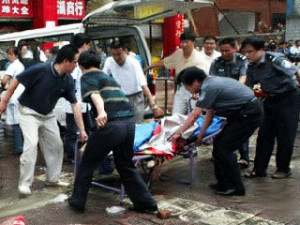
Violence again rocked the capital of China’s restive Xinjiang region, as explosives thrown from vehicles ripped through a street market, killing 31 people and injuring more than 90, Chinese state media reported.
China’s public-security ministry described the attack as a “violent terrorism case.”
The official Xinhua news agency, citing witnesses, said two vehicles rammed into people at the open-air market shortly before 8 a.m., and then explosives were thrown from them. One of the vehicles exploded, Xinhua said.
The attack comes in succession of a growing wave of violence being carried out by separatists in Xinjiang. A deadly knife attack in Kunming, hundreds of miles away from Xinjiang, indicated that the terrorism may spread beyond the restive northwest and into the rest of China.
US Backing of Separatists Invokes Suspicion Over Timing of Attack
The timing of the attacks appears to be on cue to disrupt the political shockwave sent across the globe as Russia and China initiated a game-changing energy partnership interpreted by many as a direct and significant counterstroke to US ambitions both in Eastern Europe and the Asia Pacific. Adding to suspicions is the fact that the US contributes significant support for separatist groups in Xinjiang province that vocally advocate the establishment of an autonomous East Turkistan state.
Indeed, first and foremost in backing the Xinjiang Uyghur separatists is the United States through the US State Department’s National Endowment for Democracy (NED). For China, the Western region referred to as “Xinjiang/East Turkistan” has its own webpage on NED’s site covering the various fronts funded by the US which include:
International Uyghur Human Rights and Democracy Foundation
$187,918
To advance the human rights of ethnic Uyghur women and children. The Foundation will maintain an English- and Uyghur-language website and advocate on the human rights situation of Uyghur women and children.
International Uyghur PEN Club
$45,000
To promote freedom of expression for Uyghurs. The International Uyghur PEN Club will maintain a website providing information about banned writings and the work and status of persecuted poets, historians, journalists, and others. Uyghur PEN will also conduct international advocacy campaigns on behalf of imprisoned writers.
Uyghur American Association
$280,000
To raise awareness of Uyghur human rights issues. UAA’s Uyghur Human Rights Project will research, document, and bring to international attention, independent and accurate information about human rights violations affecting the Turkic populations of the Xinjiang Uyghur Autonomous Region.
World Uyghur Congress
$185,000
To enhance the ability of Uyghur prodemocracy groups and leaders to implement effective human rights and democracy campaigns. The World Uyghur Congress will organize a conference for pro-democracy Uyghur groups and leaders on interethnic issues and conduct advocacy work on Uyghur human rights.
It should be noted that the above list was taken from NED’s website in March – since then, NED has deleted several organizations from the list, as it has done previously regarding its support in other nations ahead of intensified campaigns of destabilization it wished to cover up its role in.
All of these NED-funded organizations openly advocate separatism from China, not even recognizing China’s authority over the region to begin with – referring to it instead as “Chinese occupation.”
Of the March 2014 terror attack in Kunming, the US-funded World Uyghur Congress would even attempt to justify it by claiming Chinese authorities have left the separatists with little other choice. The US State Department’s “Radio Free Asia” report titled, “China’s Kunming Train Station Violence Leaves 33 Dead,” reported:
World Uyghur Congress spokesman Dilxat Raxit said in an emailed statement that there was “no justification for attacks on civilians” but added that discriminatory and repressive policies provoked “extreme measures” in response.
Just as the US has done in other nations it is fomenting political chaos and armed violence in such as Syria, it is attempting to steer clear of labeling the Xinjiang separatists as “terrorists” for as long as possible in order to sow the maximum amount of chaos at the cost of Chinese political stability.
US-backed Terrorism Mars Deal Today, Threatens its Expansion Tomorrow
The attacks aimed at diminishing the immediate political fallout for the West regarding the Russian-Chinese natural gas deal are also to remind the world that it will not move out from beneath Wall Street, London, and Brussel’s unipolar hegemonic international order without a fight. The terror campaigns being carried out in northwestern China, across the Caucasus region in Russia, and throughout the Middle East and North Africa have all been tied to Western geopolitical ambitions and used both as a pretext to militarily intervene and as proxy forces to destabilize and upturn political orders in targeted nations obstructing the expansion of Western corporate-financier interests.
With the Russian-Chinese gas deal undermining current Western ambitions from America’s “pivot” toward Asia, NATO’s meddling in Ukraine, and overall confidence among various stakeholders invested in the West’s current global order, the West seeks to immediately reciprocate by undermining confidence in Russia and China’s ability to implement the deal.
Beijing in the coming days, weeks, and months ahead will need to focus on strategies to defeat terrorism in Xinjiang, but it must do so with both its and the Chinese public’s full understanding of the very source of the ongoing conflict. With support for the violence coming from abroad, Beijing’s attempts to address the symptoms rather than the cause may only compound and expand the conflict.
By exposing US-backing of separatism in Xinjiang, public opinion can be turned decisively against both the resulting terror and the US networks supporting it, while bolstering support for security operations aimed at stemming it.
Tony Cartalucci, Bangkok-based geopolitical researcher and writer, especially for the online magazine “New Eastern Outlook”.
